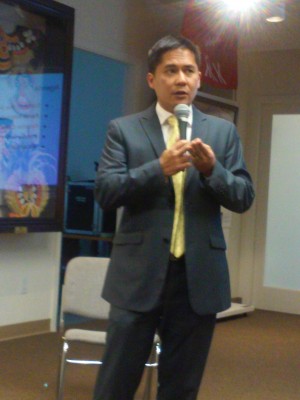
Christina Laskowski, JR Calanoc and Philippine Trade Commissioner Jose Dinsay at Panalo.co debut in San Francisco. PHOTOS BY JUN NUCUM
SAN FRANCISCO — A young Fil-Am web business development company based in Redwood City, California recently introduced itself as a connector of U.S. businesses to highly qualified technology firms in the Philippines to further boost the booming business process management (BPM) industry there.
Panalo.co, originally known as One Virtual Source, is riding on the crest of Philippine BPMs’ success, which generated $18.4 billion in revenues last year and is expected to hit around $21 billion this year.
“Basically U.S. businesses that need websites, digital or social marketing, can work with us to connect with the high-level, very qualified technology companies in the Philippines that do those projects. We are targeting small to medium-sized business owners, start-up companies,” stated Panalo Chief Executive Officer JR Calanoc.
“Our current clients here in the U.S. are small businesses like a church, school, university, restaurants, catering companies, the regular mom and pop shops that cannot afford to go to the Philippines to set up a business and hire people there.”
Panalo had about a million dollars in sales from the U.S. to the Philippines in its first year with around 110 small to medium-sized businesses linking to technology firms in the Philippines that have either 10 to 200 employees.
Panalo was hatched as a result of Philippine Ambassador Jose Cuisia’s Filipino Youth Leadership program, which sent ten people, ten young Filipino Americans to the Philippines.
Calanoc was part of the group that was exposed to technology boom there. After doing some research, he came back to the U.S. and decided to promote the Philippines by starting Panalo.
“We are trying to make company more well known, particularly to Filipinos as I think it is very natural that if Filipinos and businesses here learn that there is good talent in the Philippines, they will support and hire (the services) in the Philippines through Panalo. Also, the Americans know that Filipinos are smart, hard workers and they can connect with them through us as well,” Calanoc explained.
When U.S.-based companies outsource their service needs to the Philippines, the cost is a mere 1/3 of what it would cost here, Calanoc explained.
“Another advantage is that many Filipinos speak the American English and have similar American pop culture making them aware of latest goings-on in the U.S.,” Calanoc said. “Add to these is the big advantage of having the youngest workforce in Asia. We are graduating a lot of computer science majors, creative designers, animators etc. Right now there is so many of them looking for work, they just need the opportunities. The rest of Asia is getting older.”

Trade Commissioner Jose Dinsay gives an upbeat update on the business process management industry in the Philippines.
The rosy picture of the BPM industry was further boosted by figures cited by Trade Commissioner and Director Jose Dinsay of the Philippine Trade and Investment Center (PTIC). That sector, he said, now has around one million employees compared with only a few thousands in 2004, and it has been growing by more than 30 percent.
“There are 1,100 organizations under the sector, and it contributes 6.2 percent to the GDP,” Dinsay reported. “Although the global market grew five times from 2004 to 2014, the Philippines grew by 12 times. We have also been increasing our share of market. In 2004 we only had 4 percent of the global market, while now we have 12.3.
“There is scalability and sustainability in the Philippines because we have enough labor to support the different sectors considering that we have up to 535,000 graduates per year in different courses. This includes nurses, IT professionals, engineers and architects, lawyers and accountants,” Dinsay explained.
Also noted was the presence of Next Wave Cities (NWC) that are assessed and identified by the Information Technology and Business Process Association of the Philippines (IBPAP) together with government agencies with the goal of making the country a competitive location for IT-BPM.
NWCs are identified based on availability of talent/human resource, telecom and other infra costs, business environment and risk management. Currently labeled NWCs are Baguio, Davao, Dumaguete, Iloilo, Lipa, Metro Bulacan (Baliuag, Calumpit, Malolos, Marilao, and Meycauayan), Metro Cavite (Bacoor, Dasmariñas, and Imus), Metro Laguna (Calamba, Los Baños, and Sta. Rosa), Metro Naga (Naga and Pili), and Metro Rizal (Antipolo, Cainta and Taytay).
Metro Manila and Cebu are considered Centers of Excellence (COE) due to their developed IT-BPM ecosystem and are joined by Metro Clark and Bacolod.
Like us on Facebook

